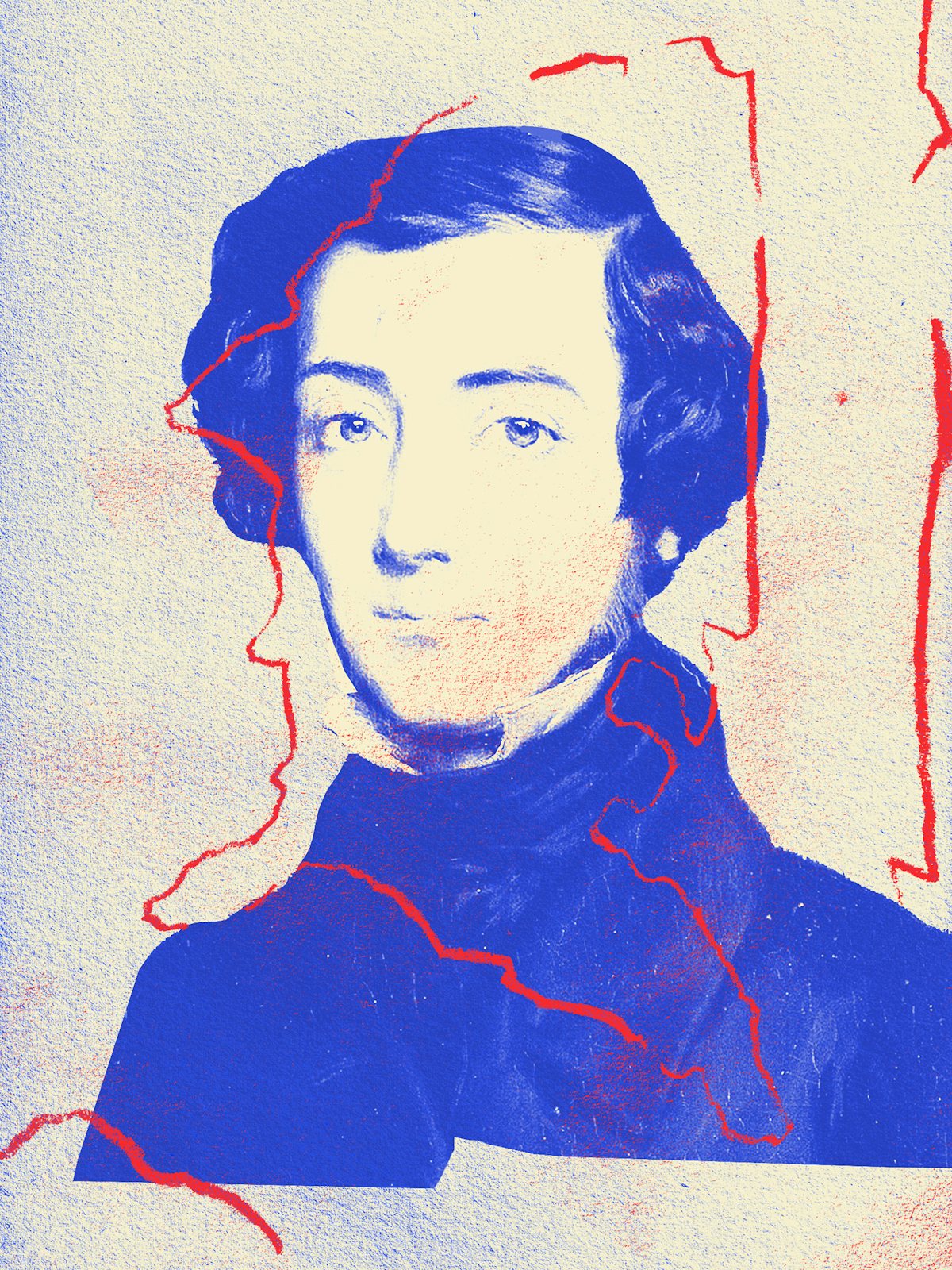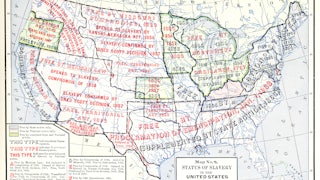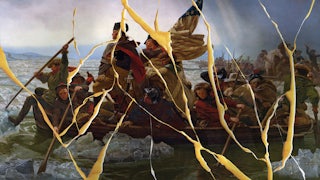During his nine months in the United States, in 1831 and 1832, the 26-year-old Alexis de Tocqueville encountered an almost cinematic cross-section of the country. He dined twice with the patrician former president and then congressman John Quincy Adams, once in Boston and once in Washington. He met with Adams’s nemesis, the populist oligarch Andrew Jackson, then in the White House, although he got little from Jackson besides chitchat and a glass of Madeira. He saw the Choctaw being driven west from their ancestral lands in the first episode of the Trail of Tears, witnessed the brutal caning of a Black man at a social gathering in Baltimore, and observed with a novelist’s eye the nursery school racial consciousness of a plantation owner’s already imperious young daughter, tended by an enslaved woman and a Native American.
Tocqueville’s travels with his friend Gustave de Beaumont, memorialized in the two volumes of Democracy in America, can seem touched by a kind of fate. On the Western frontier, not long after observing the Choctaw dispossession, the two were approached by a rider on a splendid stallion. It was Sam Houston, future president of the Republic of Texas, who had recently slipped out of his marriage and the governorship of Tennessee to return to his earlier life among the Cherokee, who called him “the Raven.” Houston lectured the young Frenchmen on the continent’s indigenous tribes, whom he professed to respect deeply. He was, at that time, riding to Congress to advocate for Native Americans.
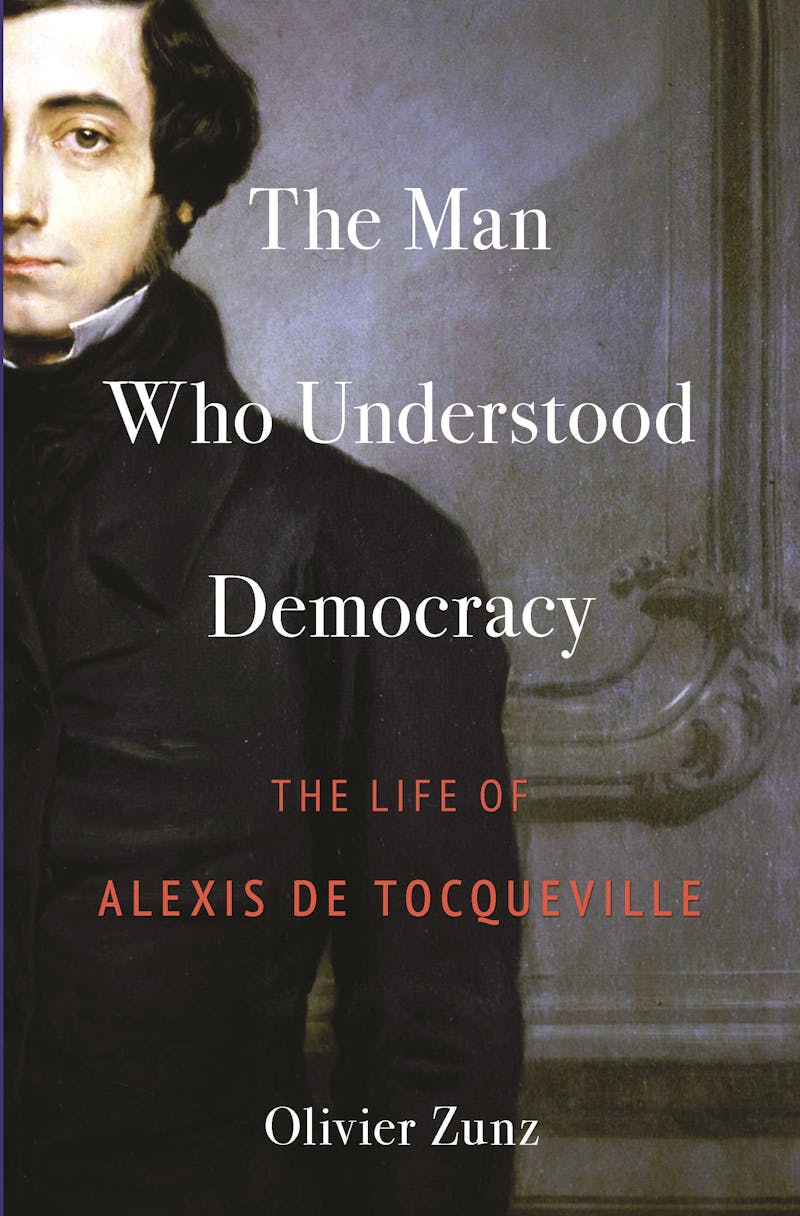
But if Tocqueville seemed picked out by fortune to see the United States whole, he also missed great swaths of what was in front of him. Attending society balls and flirting with the young women who persuaded him that democratic femininity was both free and virtuous, he missed the Great Awakening, the wildfire of Protestant religious passion that was sweeping through New York even as he made his way along the Mohawk Valley. Listening to upper-class informants, he concluded that American religion tended to be pragmatic and tolerant, and that this must be the tendency of democratic faith in general. Moving among the country’s capitalists and elite professionals, he observed abstractly the energy and churn of the young country, but formed no image of the great mercantile docks of New York and Boston or the fabric mills of Lowell, Massachusetts. When he later speculated about the prospects of industrialization and vast wealth for American democracy, his observations were drawn from a subsequent visit to Manchester, England.
In The Man Who Understood Democracy, Olivier Zunz offers many details like these, and wastes none of them. This biography gives us, often with just a few telling strokes, the ambitious but depressive young aristocrat whose extended family had gone en masse to the guillotine, the Romantic literary self-creator who labored to give his sentences an air of declamatory simplicity or give a single example the weight of revealed truth, and the liberal politician who spent his best years trying to keep both royalist reaction and socialist revolution at bay (although he was often suspected of sympathy with the first, never with the second). While Zunz clearly admires Tocqueville, he does not shy away from his subject’s impassioned imperialism, which went as far as endorsing scorched-earth warfare in Algeria: Tocqueville believed that colonizing North Africa would shore up French power and create a bracing sense of national mission, and he disappointed his liberal friends abroad, such as John Stuart Mill, by embracing the cause of France without hesitation.
The real scaffolding of the biography, for all its telling vignettes and historical context, is Tocqueville’s thought, above all Democracy in America. What was it that Tocqueville understood about democracy? A great deal of Tocqueville’s interpretation of the United States as a prophecy of democratic life was a fabric woven from conversations with the erudite lawyers and aristocratic politicians whom he sought out and trusted, his worries about the tumultuous politics of his home country, and his intuitive brilliance as a political psychologist. As his contemporary Sainte-Beuve remarked, he began to think before he knew anything, and his early thought set the mold for a short and incandescently intense life’s work as a politician and intellectual.
Born in 1805, Tocqueville grew up around the memory of the Terror. His grandparents, an aunt and uncle, and his great-grandfather were beheaded in 1794, and Tocqueville’s parents, who had awaited the guillotine in the same prison, survived only because Robespierre fell and the executions stopped. Despite his family’s wealth and connections, he always felt politically precarious, and, in turbulent decades of dynastic struggle, he often was. Tocqueville was an aristocrat who presumed—with plenty of reason—that aristocracy was being swept away, and he suspected he had been born into a world with no place for him.
All of these reasons led him to America. A bloody factional fight and insurrection switched out the Bourbon King Charles X, whose regime had patronized Tocqueville’s family, in favor of his grandson Louis Philippe, and although Tocqueville reluctantly swore loyalty to the new regime, he saw his career blocked and greater dangers lurking. He wanted to get out of the country, and to make his name on his own terms. He and Beaumont proposed a self-funded research trip to examine American penitentiaries, and the Interior Ministry approved. Although the two did visit American prisons and meet with reformers, Tocqueville’s real goal was to see, in democratic America, the future of Europe. The idea that the new world’s rapid political development foretold that of the old countries was conventional, but Tocqueville gave it vivid and penetrating expression.
His fears shaped his thinking. In the first volume of Democracy in America, he warned that taking popular sovereignty literally would invite “the tyranny of the majority,” the kind of official violence and repression that had shattered his family during the Terror. With no theoretical limit on the power of the people, and with the brakes of local institutions and counterpower of aristocracy gone, whatever passions that lit up the masses could rapidly occupy the state and call themselves justice. In particular, he believed that the appetite for equality could easily become consuming resentment against any privilege, a social leveling with no stopping place.
/ In honor of Earth Day, TNR’s climate coverage is free to registered users until April 29. Start reading now.
In his second volume, he turned to a subtler anxiety. After a crisis of faith in his youth, Tocqueville struggled with religious doubt all his life. He believed that religion was the natural state of human beings, and that doubt, once it got its hooks in, could turn to nihilism. A society of equals, he believed, might also be a society without conviction. Equality, for him, was what remained after the disappearance of aristocracy, inherited social roles, and traditional kinds of authority. It left individuals and their families more responsible for their own destinies, and also more isolated, more likely to feel overwhelmed and bewildered.
He believed that democratic politics tended to fail because official liberty of thought—free speech and so forth—did not produce real freedom, as naïve liberals hoped, but a new form of conformism and clannishness. Tocqueville judged that Americans, who were theoretically free to speak as they wished, showed less independence of mind and freedom of discussion than the people of any other country he knew of: The quiet self-certainty of fellow citizens stifled dissent with a reach and power that a censor’s office could only envy. In a democracy, he judged, “tyranny … leaves the body alone and goes straight for the soul.” A dissenter feared that he would be shunned as “an impure being” and abandoned even by his friends. Democracies drifted or lurched into effusions of radical energy or the doldrums of modest, anxious ambition and anxious, middling views.
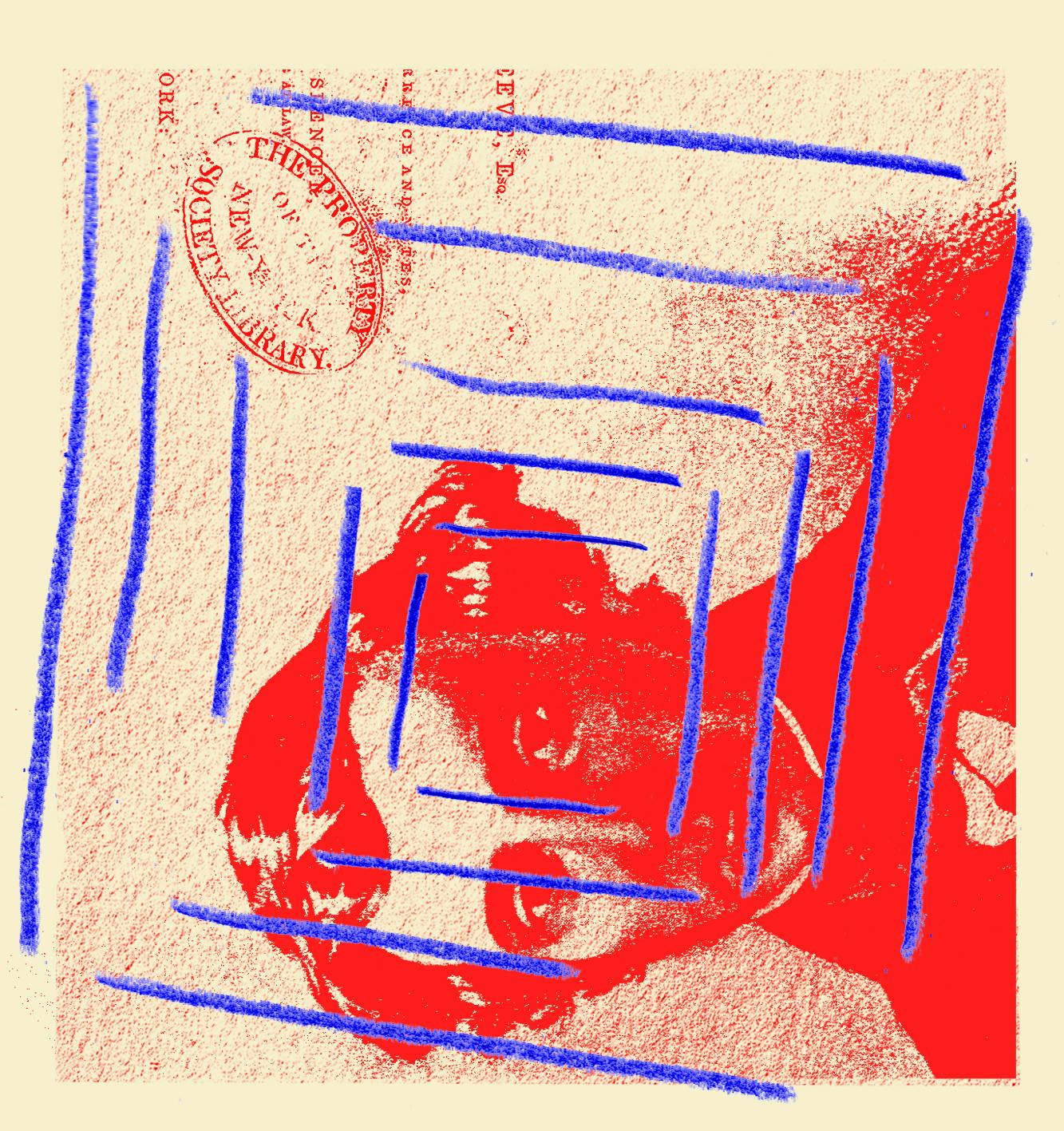
In times without great principles or goals, people might turn inward, looking after their own material interests, and enter a kind of solitary confinement: “a multitude of men, alike and equal, constantly circling around in pursuit of the petty and banal pleasures with which they glut their souls. Each one of them, withdrawn into himself, is almost unaware of the fate of the rest. As for the rest of his fellow citizens, they are near enough, but he does not notice them. He touches them but feels nothing.” In this condition, democrats would happily accept “a network of petty, complicated rules” administered by “schoolmasters.” Tocqueville called this enervated condition democratic despotism, the soft, passive twin of majority tyranny. Democracy might come with an executioner’s blade or with soothing tones, and either way it could obliterate people like Alexis de Tocqueville.
Tocqueville interpreted American democracy as a possible remedy for his anxiety. Religion and constitutional culture kept the tyranny of the majority at bay: Americans respected rights and believed in limited government too strongly for leveling campaigns. Civic engagement conferred some immunity to democratic despotism: As he portrayed them, Americans might not be idealistic, but they believed their own interests were wrapped up in the success of public and civic institutions. For self-regarding reasons, they did not become entirely self-involved.
In America, he came to believe, the idea of popular sovereignty—the people ruling themselves as equals—was a myth. Democracy in that sense was impossible to achieve, and trying, as some revolutionaries had done, was dangerous. Tocqueville moved thinking about democracy from political to sociological ground. He defined democracy not as a mode of collective rule, but as a social situation: what he called “equality of conditions.” American democracy succeeded, as far as it did, because talk of popular sovereignty was the dressing for much more substantial sources of order. These included a political culture that gave individual rights a central place, a Christian religious inheritance that conferred a shared moral sensibility, and a web of institutions, such as local government and voluntary organizations, that gave people practical experience in managing their own affairs.
Did Tocqueville offer deep truths about democracy or an evasion of it? Both. As for insight, he saw that there is nothing magical about counting votes: For people to accept one another as their equals and co-rulers takes a great act of imagination, sustained—or undermined—by millions of small acts in daily life. Democracy was not just a new mode of government, but a new world, which would touch and change everything within it. People would become both more certain of their individual uniqueness and worth and more like one another, more generic, and from the hearth to the battlefield this new kind of person would do things in new ways. Part of the pleasure of reading Democracy in America is the range of its social observation and, indeed, sheer speculation on subjects from American manners and marriage (unforced and egalitarian in both cases, Tocqueville thought) to ambition (intense but seldom lofty) to the likely future of democratic poetry and religion, which he expected would become abstract and pantheistic, at once personalized and generic (spiritual but not religious, anyone?).
Tocqueville saw that, in this changed world, politics would remain both essential and dangerous, but in ways that changed with everything else. If democracy did not mean a new golden age of peace and virtue, as some of its giddier supporters imagined, nor the end of the world, as the Terror must have seemed to Tocqueville’s own family, then the themes of political life would have to be rethought for a new kind of life. His analyses of the tyranny of the majority, democratic despotism, constitutional ideology, and civic participation were all contributions to this rethinking, updates of the very old themes of liberty and tyranny, order and disorder, conflict and harmony, for a world of people who believed fiercely in their own equality.
To say that democracy depends on culture is close to a truism, though an important one. Tocqueville believed that it depended on elements of culture that a democrat might regard as positively anti-democratic: an implicit consensus on what government should do that prevented serious questions of distribution or social organization from becoming political contests. Tocqueville despised the socialism that burst into French politics in the revolutionary struggles of 1848, which he saw as seeking to “overturn … society itself.” Its doctrine that the masses should make a new social order, that the freedom of equals meant dignified and pleasurable work and the satisfaction of human needs, seemed to Tocqueville to promise first the tyranny of the majority—smashing existing laws, institutions, and ruling classes—and then democratic despotism, making the state “not only the director of society but also the master of each individual … his tutor, his teacher.” Tocqueville believed the Americans had headed off this trajectory with their localism, their culture of rights, and their constitutionalism. Their lesson for sustaining democracy was to take its promise of equality, as the phrase has it, seriously but not literally.
Tocqueville invited readers to join him in thinking aristocratically about their democracy, standing apart from it in their minds, translating its phrases about equality and popular sovereignty into something more subtle and esoteric. This was a Herculean interpretive task, in which he persuaded others to see their world as he struggled to see it—as a world with room for Tocquevilles. It was also, fairly straightforwardly, an extension of the perspective of people like him, whom he sought out and listened to wherever he went. His American informants were elites, often from leading professions and old families, who were finding their footing amid Jacksonian populism. Tocqueville was able to speak most productively with informants who could converse in French, a powerful screening mechanism for class, and surely part of the reason he took so much from the erudite dynast John Quincy Adams and very little from the rough-hewn frontier orphan Andrew Jackson—let alone from laborers or the indigenous or enslaved people whom he saw but did not engage.
Zunz ties Tocqueville’s legacy to his abolitionism, noting that Charles Sumner, the abolitionist senator from Massachusetts, included a discussion of Tocqueville’s denunciation of the slavery system, as well as his forecast of national power and continental domination, in a late work, Prophetic Voices Concerning America.
The use of Tocqueville’s ideas in American politics, however, has been quite morally mixed. In the foreword to the first U.S. edition of Democracy in America, the New York lawyer John Spencer, one of Tocqueville’s major informants and a lifelong correspondent thereafter, presented Tocqueville as a fatalist about this great national crime: “his remarks on slavery,” Spencer wrote, were “masterly” and “lead to the melancholy conclusion of the utter impotency of human effort to eradicate this acknowledged evil.” For Spencer, Tocqueville’s demonstration that democracy was rooted in the “manners, habits, and opinions” of a people, more than in their conceits about popular sovereignty, showed that democracy could not be extended across the color line, because it depended on the organic cultural norms of the dominant white population. Democracy in this account was a political culture of, by, and for white Americans. To imagine that it could make the world afresh for everyone, as Thomas Paine had proposed, was to indulge a dream that no mature person should take seriously.
In 1899, a new, lavishly illustrated edition of Democracy in America appeared from the Colonial Press of New York. It featured an introduction from Senator John Morgan of Alabama, who had been a Confederate general. Morgan drew on Tocqueville’s emphasis on norms to explain that the Thirteenth, Fourteenth, and Fifteenth Amendments to the Constitution, abolishing slavery and establishing legal equality after the Civil War, would have to fail. Intended as the kind of abstract, ideological revolution that Tocqueville mistrusted, they would instead be quietly vetoed by “the unwritten law of the natural aversion of the races … in public opinion, which is the vital force in every law in a free government.” Two years later, Alabama joined other Southern states in adopting “redemption” amendments to its state constitution, which imposed literacy tests and poll taxes on voters, effectively disenfranchising Black and Populist poor white voters and securing Jim Crow. And three years after that, the Alabama Democratic Party adopted the slogan “White Supremacy,” which helpfully appeared on its ballot line until 1966.
Tocqueville did not believe in race in that grotesque nineteenth-century way that posited essential differences among human lineages, but he believed that culture determined politics, and that attempts to remake culture by political means were misbegotten and headed for trouble. He gave comfort to anyone who believed that history was fate, that a people could only be what it already was, or, at best, could hope to change only slowly and organically. His thought was always available to attack whoever thought that the Constitution or national laws could be vehicles to change the habits of the heart. In today’s phrase, he believed that racism was in the cultural DNA of the United States. He might not have shared Spencer’s and Morgan’s conclusions, but they did not misread him.
Tocqueville’s thought was available for these purposes in part because he tended to overlook the ways in which politics had always shaped culture. When he encountered antebellum American racism, he did not see the centuries of laws elaborating and enforcing racial categories, from the “one-drop rule” that formed the color line to bans on interracial marriage to criminal penalties indexed to the race of victim and offender, which had produced the social world in which a plantation owner’s toddler could see race as readily as she saw weather. Looking at the Constitution, he saw its roots in English ideas of rights and admired its drafters’ efforts to slow down politics by dividing power among three branches. He slid over the fact that the Constitution was, on its own terms, a product of popular sovereignty, an act of self-making by “We the People” that, by its very existence, implied that other such acts might be possible.
He did not listen to anyone like James Wilson, the framer and scholarly lawyer who held firmly that living generations must have the power to change their fundamental law if they were to consider themselves free. Visiting a country buffeted by the Jacksonian insurgency from one that still remembered the Jacobins, Tocqueville decided instead that popular sovereignty was a fetish of populists and radicals. The democracy that he described after excising actual self-rule was infinitely interesting, from a sociological and even literary point of view, but it was not really a form of collective power over common life. Indeed, that was the point.
More than a century later, in the Cold War, Tocqueville could seem a wise man of anti-totalitarian liberalism—a figure chastened by history’s terrors, unillusioned about utopian promises, and able to help keep democracy on a narrow but smooth path. As the prominent conservative scholar Robert Nisbet put it in 1977, American democrats had learned from Tocqueville that “totalitarianism could be understood best, not as a reversion to a dark past, but as a product, however corrupt, of democratic modernity.” Tocqueville’s account of American constitutionalism especially fit these themes. The eighteenth-century Constitution might have its anachronisms, such as the Electoral College, but it was the repository of wisdom about the value of limited government. Even more, it was the touchstone of a common culture, the text of a civic faith.
The world that elevated Tocqueville in these terms is very far away now. The Constitution he praised for making democracy work by putting it in its place has fostered a minority-rule party that can hold national power thanks to the anti-majoritarian anachronisms of the Electoral College and the Senate. Whereas Tocqueville pictured a quiet moral consensus stabilizing politics, our politics fosters warring cultures of mutual contempt and fear. As a prophetic admirer of American achievement, he has been wrong-footed by the twenty-first century.
Maybe Tocqueville’s problem was that his diagnoses slotted too easily into American complacency. Our time—which is not complacent, whatever its other vices—might benefit from a fresh encounter with Tocqueville’s conviction that politics can drive us mad, and his effort to study it like a psychologist seeking handholds for sanity.
Tocqueville’s most telling observation, still true, is that so-called democracies are usually something else. They stabilize themselves by evading democracy, building up their own aristocracies, and erecting ideological firewalls against popular sovereignty. Whether that evasion of democracy is something to be cherished or to be overcome is another question. But to see the question in that light is already a remarkable gift to receive across nearly two centuries.
